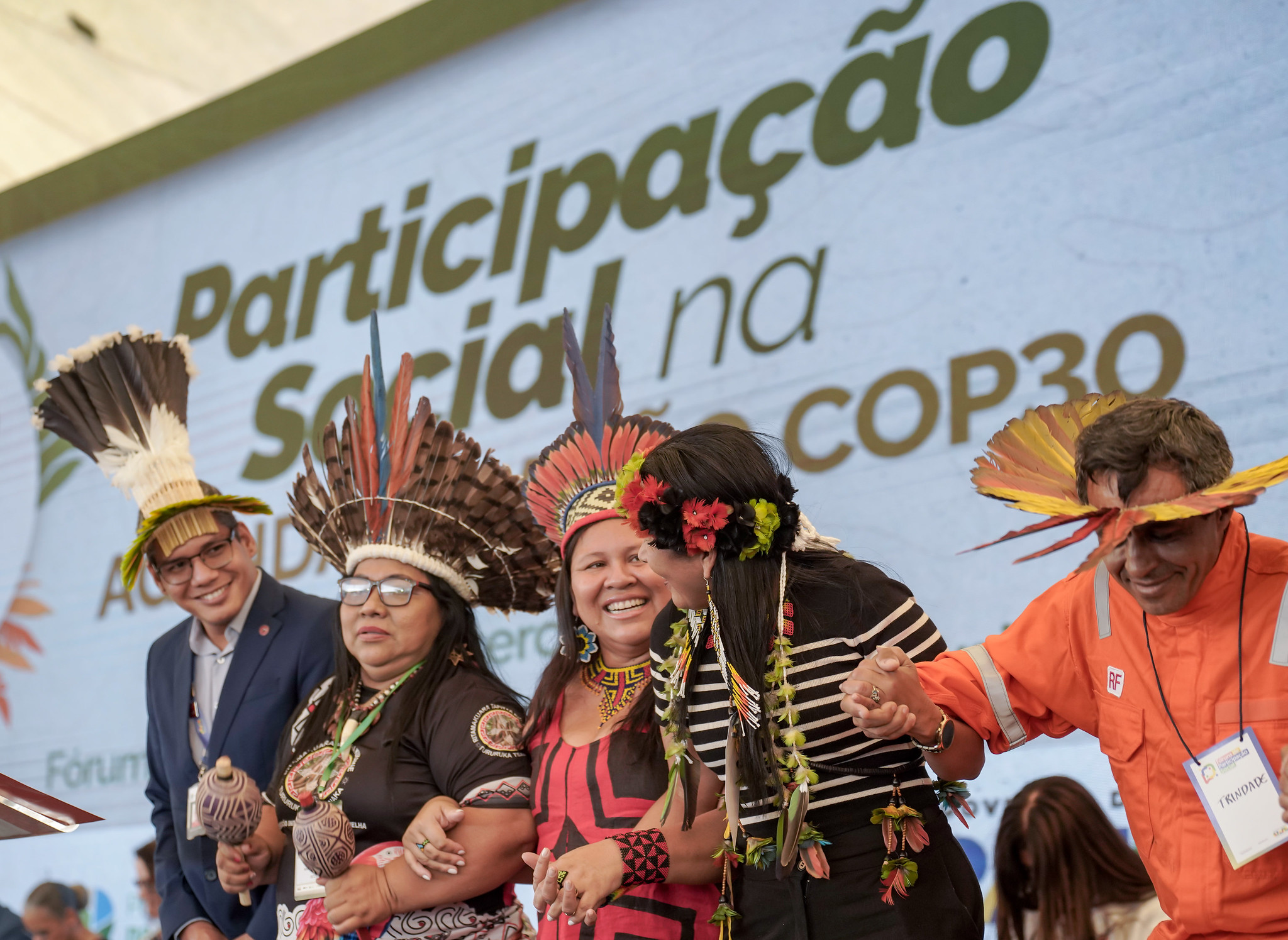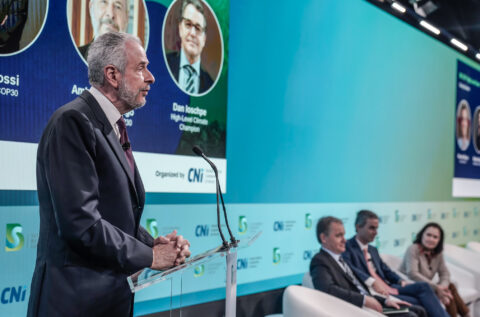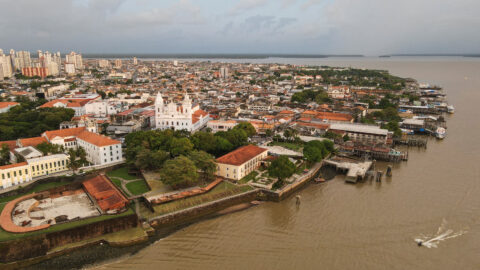Expensive accommodation, combined with restricted funding and accreditation, are set to limit the participation of Global South climate activists in COP30, casting doubt on Brazil’s promise to host the most inclusive UN climate summit ever.
Civil society groups told Climate Home News that the COP30 presidency’s failure to make affordable lodgings available in the Amazon city is pricing out many activists from countries at the forefront of the climate crisis, who are struggling to pay their way.
Campaigners had been enthusiastically preparing for this year’s talks in Brazil after their ability to demonstrate was severely limited at the last three COPs hosted in Egypt, the United Arab Emirates and Azerbaijan – authoritarian regimes with limited or no freedom to protest and poor human rights records.
But with basic rooms in Belém costing hundreds of dollars per night, many are being forced to stay at home this time around.
“Brazil has been a disappointment for a lot of us,” said Rachitaa Gupta, global coordinator of the Global Campaign to Demand Climate Justice (DCJ), a network of over 200 organisations primarily from the Global South.
“This was a key moment for us because for the first time in many years we have been able to organise a huge people’s movement and mobilisation on the ground,” she added. “But we have had to scale that down significantly.”
A COP30 presidency spokesperson told Climate Home that the Brazilian government is taking concrete measures to ensure broad civil society participation, with a particular focus on the Global South, and has been responding to concerns expressed by organisations.
The measures include making available lower cost accommodation in university dormitories, schools and temporary housing facilities, they said, as well as negotiating discounted rates with hotels and transport providers.
Lula aims to host “the best COP in history”
Since President Luiz Inácio Lula da Silva first announced in early 2023 that Belém would host COP30, the Brazilian government has been talking up the symbolism of bringing the annual UN climate summit to the Amazon rainforest, which plays a vital role in absorbing planet-heating carbon and regulating the Earth’s climate.
“I leave Pará with the certainty that we will hold the best COP in history,” Lula said in February after he visited the northeastern state of Pará, whose capital is Belém.


Pará state governor, Helder Barbalho, told The Guardian in April that “it will be the COP with the greatest popular participation in history and that is something we have particularly encouraged”.
However, local hotels hiked rates to exorbitant levels in anticipation of high demand, despite efforts by the COP30 presidency to persuade them to bring them down. A deal was done to help developing-countries’ official delegations find cheaper accommodation at fixed rates, but those were not extended to non-governmental organisations, businesses or media.
Official booking platform late and “glitchy”
The DCJ’s Gupta said the logistical chaos has more to do with the COP presidency’s “complete planning failure”, rather than being an issue with an Amazon port city itself.
As room prices on commercial accommodation sites like Booking.com and Airbnb skyrocketed early this year, local officials insisted the market would “stabilise” once the COP30 team launched its own platform.
But when it finally appeared in mid-July after repeated delays, it was met with disappointment.
“There were frankly horrendous accommodation options that were very, very expensive,” Gupta said. She added that information is often “misleading” and those who managed to book couldn’t keep the accommodation because the system is “glitchy”.
Brazil launches COP30 accommodation platform after pressure from UN committee
When civil society groups voiced their concerns with the presidency in August, Gupta said the COP30 team responded with a plan to convert large buildings, such as schools and offices, into shared accommodation.
“For us, this was problematic because we cannot be seen as an afterthought and it’s not fair that civil society is reduced to being put into dormitory-style accommodation, like some kind of cattle being hoarded,” she said.
She added that many Global South campaigners come from conservative cultures and find it difficult to share rooms in mixed settings.
Reduced numbers attending
As a result, NGOs are slimming down the size of their delegations compared to COP28 in Dubai and what they had originally planned for Belém.
According to Gupta, many people in the DCJ network have ultimately decided against attending COP30 because of the pricey accommodation on top of costly flights to get there.
“It is specifically disappointing because we had anticipated doubling participation this year,” Gupta added.
Mariano Villares, co-founder of the Argentine organisation Sustentabilidad Sin Fronteras, told Climate Home that five members of their team had been planning to travel to Belém “to make the most of the COP’s return to Latin America after 11 years” – but only two will now be able to go.
“The prices and conditions of accommodation drive out civil society from the Global South. The climate conversation loses diversity when the voices most affected by the impacts are left out,” he said.


Marina Agortimevor, coordinator of the Africa Just Transition Network, told Climate Home the network had sent more than 15 of its members from grassroots organisations to past climate talks. But this time, because of funding cuts and the high cost of accommodation, it can barely manage to send four members to Belém.
While this COP has been billed as an inclusive conference, “inclusivity is still based on what is in your pocket”, Agortimevor said.
Other African civil society groups told Climate Home funders who had supported their attendance at previous climate talks had backed out of financing their participation at COP30 due to the high costs.
Limited accreditation allocations
In addition, Agortimevor said some Africa Just Transition Network members have struggled to get accreditation for the COP in Brazil, another factor that appears to be working against the wide participation of civil society.
Sustentabilidad Sin Fronteras said it had received less than a third of the accreditations it got last year, also limiting the size of its delegation in Belém.
One Latin American organisation – which asked not to be named – said it would have to divide up the three badges it had received so that some team members can attend the first week and others the second. “Some people need to be there for both weeks due to the work being done, and this situation has limited our activities,” they said.
The lower number of accreditations is a trend heard from most of the Latin American organisations Climate Home spoke with. Some are seeking other ways to get their staff into the conference, such as asking their countries’ governments to register them as “party overflow”.
When asked about this issue by Climate Home, a UN official said requests for COP accreditation by NGOs had increased “significantly” in recent years, with 4,000 organisations now registered as observer groups. The size of COP venues, however, has stayed the same, meaning that “the portions available to each organisation naturally become smaller”.
“This is not about restricting participation for any particular group, but rather a reflection of the growing interest, which affects everyone,” the official said, adding that the UN climate change body has been working specifically to enhance representation from developing countries as requested by governments at last year’s mid-year climate talks.


Blow to climate justice?
Osver Polo Carrasco, coordinator of the ambition and NDC working group of the CAN Latin America network, expressed concern about the limitations all this may pose on civil society in doing its job of monitoring and providing oversight of developments at COP30.
This problem was already been experienced at last week’s pre-COP in Brasilia, he added, “where access was very limited for civil society and also for the written press”.
One African Group negotiator – who is not attending COP30 because of the “prohibitive costs” – said the exclusion of himself and other representatives of governments and civil society from the continent “is not just an economic failure – it’s a political one”.
“It undermines representation, weakens multilateralism amid uncertainties like a potential US absence, and threatens the legitimacy and momentum needed for an inclusive and ambitious COP30,” he said.
He warned that “without the voices of those on the frontlines, climate justice becomes a hollow promise.”
The COP30 presidency said the substantive participation of Global South organisations “is essential for the credibility of the conference”, noting that it had already consulted with a wide range of groups, representing Indigenous peoples, youth and women among others, to ensure they can influence and engage in the summit.
“COP30 is being planned as a milestone for placing climate justice at the center, treating the full participation of civil society organisations as a pillar of this commitment,” the presidency spokesperson told Climate Home.
The post Global South campaigners question inclusivity of COP30 as some stay home appeared first on Climate Home News.
Global South campaigners question inclusivity of COP30 as some stay home
Climate Change
Trump Administration Dropped Controversial Climate Report From Its Decision to Rescind EPA Endangerment Finding
The final EPA rule explicitly omitted the report commissioned last year to justify revoking the endangerment finding, citing “concerns raised by some commenters.”
When the U.S. Environmental Protection Agency rescinded its bedrock endangerment finding Thursday, it explicitly excluded a controversial report issued last year by the U.S. Department of Energy that argued the dangers of human-induced climate change were being overstated.
Climate Change
The First Casualty of Trump’s Climate Action Repeal: The U.S. EV Transition
Tailpipe standards meant to hasten adoption of electric vehicles were slashed alongside the scientific basis for regulating greenhouse gas emissions. That will come at a cost.
With the repeal of the Environmental Protection Agency’s scientific finding on the dangers of greenhouse gases, the Trump administration is aiming to take out many federal actions on climate change in one blast.
The First Casualty of Trump’s Climate Action Repeal: The U.S. EV Transition
Climate Change
Five Years Into a Fishing Ban, the Yangtze River Is Teeming With Life
A doubling of fish biomass along Asia’s longest river shows hope for large-scale conservation efforts and a lifeline for the endangered finless porpoise.
Flowing almost 4,000 miles from the Tibetan Plateau to the East China Sea, the Yangtze is China’s “Mother River.” From the emerald-green rice paddies of Hunan to the industrial hubs of Wuhan and Shanghai, the river basin generates 40 percent of the nation’s economic output. Yet, 70 years of rapid development had, until recently, wreaked havoc on its delicate marine ecosystem.
Five Years Into a Fishing Ban, the Yangtze River Is Teeming With Life
-
Climate Change6 months ago
Guest post: Why China is still building new coal – and when it might stop
-
Greenhouse Gases6 months ago
Guest post: Why China is still building new coal – and when it might stop
-
Climate Change2 years ago
Bill Discounting Climate Change in Florida’s Energy Policy Awaits DeSantis’ Approval
-

 Greenhouse Gases2 years ago
Greenhouse Gases2 years ago嘉宾来稿:满足中国增长的用电需求 光伏加储能“比新建煤电更实惠”
-
Climate Change2 years ago
Spanish-language misinformation on renewable energy spreads online, report shows
-

 Climate Change2 years ago
Climate Change2 years ago嘉宾来稿:满足中国增长的用电需求 光伏加储能“比新建煤电更实惠”
-
Climate Change Videos2 years ago
The toxic gas flares fuelling Nigeria’s climate change – BBC News
-

 Carbon Footprint2 years ago
Carbon Footprint2 years agoUS SEC’s Climate Disclosure Rules Spur Renewed Interest in Carbon Credits






